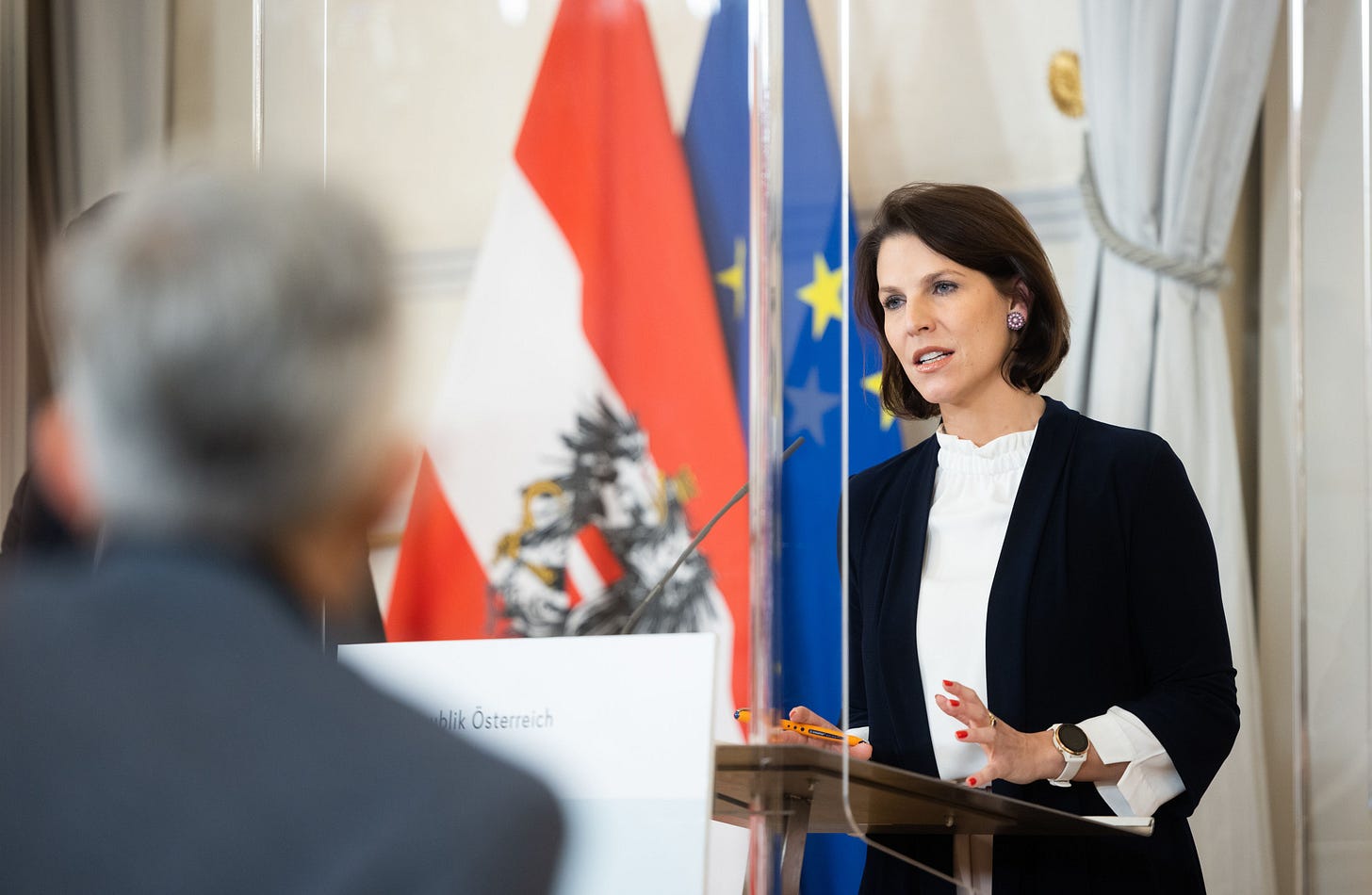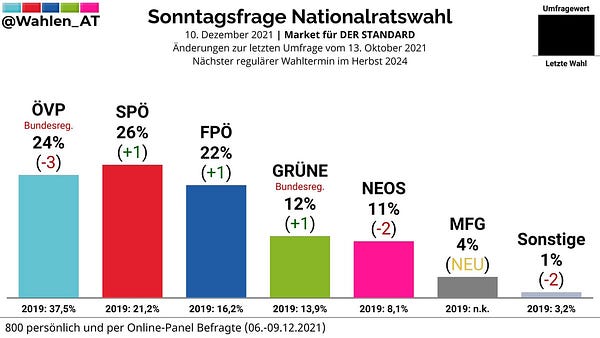Vax or Tax?
Austria will introduce mandatory vaccination against COVID-19 in February 2022, with fines totaling up to €3,600 for those who do not comply

Servus!
“I didn't want us to have a society in a culture where we forced people to get vaccinated; I don’t think that’s ever been the way we do things in this country,” British prime minister Boris Johnson said a Downing Street press conference on Thursday by way of a throat-clearing before the ‘but’. And then came the ‘but’: “I want to be absolutely clear: I don't believe we can keep going indefinitely with non-pharmaceutical interventions, I mean, restrictions on people's way of life just because a substantial proportion of the population still sadly, has not got vaccinated. I think we do need to have a national conversation about the way forward.”
The way Johnson spoke about the possibility of a vaccine mandate reminded me of how former chancellor Sebastian Kurz addressed the issue of mask-wearing at the beginning of the pandemic. He introduced masks as if they were alien to Austrian culture—something worn by people as a matter of routine in east Asia, but not here, not by us—before going on to make them mandatory. Indeed, Johnson’s formulation also reminded me of how Austria’s political class previously spoke about a vaccine mandate, denying vehemently throughout the summer and autumn that such a thing would ever come to pass before going on to become the first country in Europe to introduce one when the conditions on the ground demanded it.
A vaccine mandate had previously seemed unlikely in Austria. As I say, there seemed little desire for one on the part of chancellor Kurz who preferred to stress notions of self-responsibility and individual choice. It was unclear how a vaccine mandate could ever be enforced—how, after all, does the state coerce someone into getting a vaccine they do not want? And can they? A vaccine mandate, depending on how it was written into law, could have been open to challenge on constitutional grounds at either the Austrian or European level should it clash with a person’s protected freedom of religion or conscience.
But both the change in chancellor from Kurz to Alexander Schallenberg (and now Karl Nehammer) and the rapidly deteriorating situation in Austria’s hospitals at the end of October and beginning of November forced a change of direction. A vaccine mandate, former chancellor Schallenberg announced in mid-November, would come into force in February 2022. Health minister Wolfgang Mückstein further clarified last week that the way it will be enforced is not by the state jamming needles into people’s arms—as hysterical far-right critics in Austria would have it—but with fines for non-compliance. Those who wish to remain unvaccinated can still do so, provided they can afford to pay a penalty of €600 every three months up to a maximum value of €3,600.
Over the weekend, the far-right once more organized demonstrations in Vienna and other cities against the country’s coronavirus countermeasures—including the vaccine mandate. Freedom Party (FPÖ) leader Herbert Kickl has said his party is not anti-vaxx, but rather would simply like to see the country’s focus shift from the vaccine to treating the virus and its symptoms with medication—a distinction without a difference. At the previous round of protests, the party’s health spokesperson told demonstrators Dagmar Belakowitsch that Austria’s hospitals are full not with unvaccinated COVID patients but vaccinated people suffering from “vaccine injury.”
Austria has a problem. There is, on the one hand, a stubborn residuum attracted to the far-right and given over to conspiracy theories that, it seems, would rather die than get the vaccine. On the other, there is a less politicized pool of unvaccinated Austrians who, for whatever reason—be it misinformation or otherwise—have yet to get the vaccine. It is the latter that has to be reached in order for the country to get at least 80 percent of the population vaccinated against COVID-19 and for the cycle of waves and lockdowns to be broken. The government has decided that the best or perhaps only way to do this is via a vaccine mandate. Austria may be the first country in Europe to make this decision—but it will not be the last.
Bis bald!
The Vienna Briefing has been in publication for over a year and now goes out to hundreds of subscribers every week. Thank you to each and every one of you who has signed up so far and helped to make this newsletter a success. And if you know any potential readers of the Vienna Briefing, I would be very grateful if you shared it with them today.
SPÖ Ahead
Only 37 percent of Austrians are in favor of new elections, according to a poll conducted by Market for the Standard. Pollsters also found, were an election held tomorrow, the Social Democratic Party (SPÖ) would come out on top with 26 percent of the vote, followed by the People’s Party (ÖVP) on 24 percent and FPÖ on 22 percent.


Jewish Students Challenge Minister
Noble Prize winner Elfriede Jelinek and former supreme court president Irmgard Griss have signed an open letter calling for interior minister Gerhard Karner to resign. The Austrian Union of Jewish Students, which organized the letter, objects to Karner’s support as mayor of Texingtal for a museum honoring the Austrofascist dictator Engelbert Dollfuss and to previous remarks it believes were antisemitic.
Omicron Update
Austria has thus far recorded 59 cases of the Omicron variant, health minister Mückstein confirmed Tuesday. Noting the more infectious nature of Omicron, Mückstein appealed for all those eligible to get their third booster jabs before Christmas.




